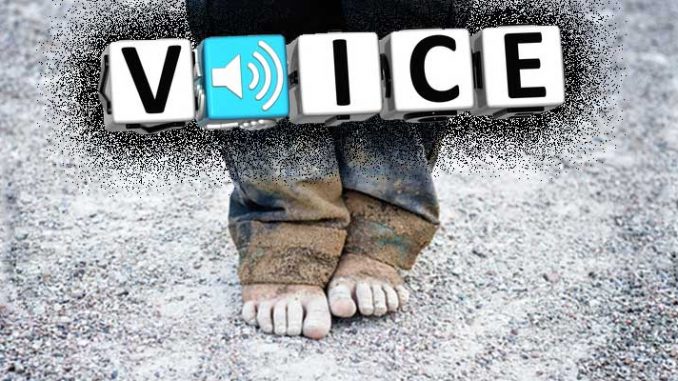I recently came across a site that listed 6 myths about advocacy. I have heard variations of all of them before. It was interesting to see them gathered up in one place.
I personally had two reactions.
My first reaction was to revisit website of the Voice of the Poor of the Society of St. Vincent de Paul.
I am an admirer of their Voice of the Poor initiatives. They have a page on their website that makes a strong case for Vincentians to be the voice of the poor and those who are on the peripheries of our society.
Their insight is striking in its simplicity.
An important part of that mission is to bring the stories of the people we visit into the public spotlight. No other charity or social service agency visits people in their homes, listens to their stories, and offers such compassionate hope and aid. This puts us in a unique position to inform our elected representatives and our community how decisions affect the people for whom we care. In particular, we want to hold our elected representatives accountable for the decisions that they make that affect the poor.
My second reaction was to ask myself the question how hard or complicated is it to make a telephone call? Keep in mind that advocacy works!
It certainly seems to be easier than doing the home visits the members of the Society have been doing so well and quietly for centuries. Many of the visitors to this site are engaged in ministries of service to those living on the peripheries.
What holds us back from lifting the phone and speaking for those who do not know how to negotiate our systems?
With that in mind, I read the following myths of advocacy as a kind of examination of conscience.
My job won’t let me advocate.
Many employees feel that their employer will not allow them to advocate. If you are a citizen of Louisiana you not only have the right, but the responsibility to advocate for causes that are important to you. No job can tell you what you can and cannot do when you are not representing your employer or using their resources.
I just don’t have the time.
Most of us don’t have a lot of extra time. But if we don’t speak out for our own rights on issues such as access to healthy foods and healthy workplaces, who will speak for us? On some issues, it takes as little as five letters or phone calls to tilt a policymaker’s opinion one way or the other.
I won’t make a difference.
Every voice makes a difference. Look at recent presidential elections. The decision sometimes comes down to a few votes in a few states. Your opinion matters, but it only makes a difference if you make it known. The assumption that your voice won’t make a difference is what makes bad public policy possible.
Someone else will do it.
It is probably true that someone else will contact your legislator, but how do you know they are working for the same cause? There are many groups trying to get their voices heard. If they are talking and you are silent, how will anyone know your point of view? Your silence makes your opponents’ voices even louder. Absolutely no one is going to advocate for our priorities—except us. And in many cases others may be fighting against us. There are millions of Americans who share our goals and objectives. Think how easy it would be to change things if each person took only five minutes out of their day to make that phone call or write that letter.
Nothing ever changes.
How often have you heard this? Sometimes, it seems like glaciers move faster than the legislative process. Legislative change happens slowly; the system is engineered this way on purpose. If laws were easy to change, then every swing of public opinion could change laws that would swiftly affect citizens. Though the system is slow, change does happen and you can affect change.
I don’t know enough.
You don’t have to know all the details of a bill. Legislators don’t expect you to. All you have to know is why the bill is important. Elected officials put a high value on input from the people they represent.
With all of our talk about working smarter and systemic change hopefully we will be able to move beyond these myths and our inertia.








0 Comments